World Conference, Religions Creeds and
Value Systems:
Joining Forces to Enhance Equal Citizenship Rights


On 25 June 2018 I participated in the World Conference on Religions, Creeds and Value Systems: Joining Forces to Enhance Equal Citizenship Rights, held at the United Nations Palais des Nations under the patronage of H.R.H. Prince El Hassan bin Talal of the Hashemite Kingdom of Jordan, who gave the opening keynote, along with a message from the UN Secretary-General. It was organized by the Geneva Centre for Human Rights Advancement and Global Dialogue, and co-sponsored by the Arab Though Forum, Bridges to Common Ground, the European Centre for Peace and Development (which I represented), the International Catholic Migration Commission, the World Council of Churches, the World Council of Religious Leaders, and the United Nations Institute for Training an Research (UNITAR). The 34 speakers and panelists included high level representatives of Islam, the Catholic and Protestant churches, Judaism, Hinduism, Buddhism and interfaith movements, as well as former ministers, ambassadors, heads of UN agencies, academics and theologians, and several Special Rapporteurs on human rights.
Panels focussed on the concept of equal citizenship and points of convergence between religions; vulnerable and discriminated social segments; migrants and refugees, and moving towards a new paradigm. I was a panelist on Migrants, refugees and internally displaced persons, representing the International Environment Forum, with a paper on Religion and Migration. A declaration was signed at the end of the conference, and the proceedings and papers will eventually be published.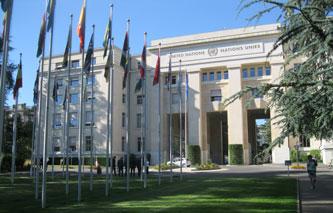 .
. 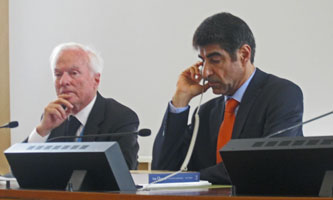 .
. 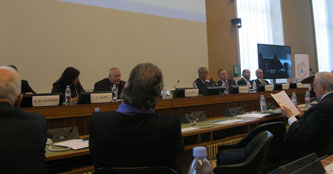
Palais des Nations; Conference co-organizers Ambassador Idriss
Jazairy and HE Dr Hanif Hassan Ali Al Qassim; keynotes on
religious perspectives
In his inaugural address, H.R.H. Prince El Hassan bin Talal asked if this was a make-or-break moment, with a gold curtain separating rich and poor, and an insecurity council unable to address weapons that destabilise the world. He described the global hunger for human dignity, and the need to speak out against injustice, calling for a social global Marshall Plan. We should empower and enable international citizenship to wage peace, which is less expensive than war, for our mutually assured survival. Only fearlessness is adequate for our time. He hoped that the Global Compacts for Migration and for Refugees would be agreed by the end of 2018. To support the 2030 Agenda, we need a moral lobby for equal citizenship rights, appreciating our diversity.
There were then eight keynotes on religious perspectives which shared common themes of the need for dialogue among religions to stand up for our shared humanity and nurture equality in schools, jobs and places of worship. Today the religious and secular worlds are separated by a huge gap, with religion seen as part of the problem. Extremism and fanaticism kill religion, and religious leaders must speak out against the instrumentalization of religion for division. Religions should serve as a bridge over differences, since they share one common origin, thus ensuring religious freedom for all.
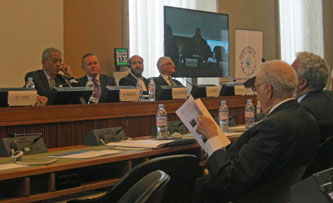 .
. 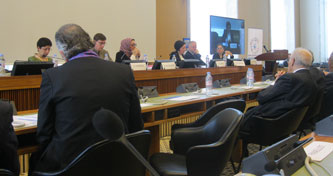 .
. 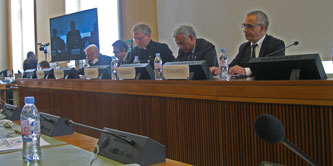
Keynotes on Religious perspectives; Panel on discriminated social
segments; Panel on a new paradigm
A first panel focussed on the concept of equal citizenship and points of convergence between religions, with reference to an extensive working document prepared by the organizers. Religions agree on almost all points, with only 10% of theological differences. Humanity is a single family, and we have responsibilities towards each other and the world. Several panelists referred to shared positions on human rights, and on the needs of refugees and migrants.
A second panel considered equal citizenship rights for vulnerable, disadvantaged and discriminated social segments, looking at case studies of gender, religious minorities, people with disabilities, and indigenous people. It highlighted citizenship as a moral concept, and the need to educate for citizenship and participation in decision-making. Still today, there are movements using fear of minorities, xenophobia, chauvinistic nationalism and toxic rhetoric, reinforced by hate speech in social media. More than three quarters of stateless people are minorities. The UN only began to engage with religion in 2010, with an Interagency Task Force on Religion. The 2006 Convention on Rights of Persons with Disabilities has changed the approach from medical (protected patients) to social, opening the way for the disabled to be integrated into society.
The third panel explored issues with migrants, refugees, and internally-displaced persons. People move to escape violence, persecution, or poverty and lack of opportunities, and suffer from the breakdown in education, health, shelter, security and land rights. Neoliberal policies are not based on the dignity of human beings and protection of the environment, leaving far too many behind, and creating a growing disconnect with the economic and social elite. Faith movements have a responsibility to move forward on this issue, becoming a driving force for a sustainable world order. There is a new level of dynamism at the inter-religious level based on shared principles and values, but there is still too little sharing of knowledge and working together among faiths. We need spiritual values and a moral compass to address this issue. All displaced persons have human rights, and a lack of citizenship undermines their human potential. Many displacements can drag on for years, and will increasingly become permanent, for example from small island developing states. Present arrangements to deal with this are insufficient. I was one of the panelists, with a paper on <b>Religion and Migration</b>. A short report is on the <a href="http://www.gchragd.org/en/article/dr-arthur-dahl-migrants-are-denied-most-fundamental-human-rights">conference web site</a>, and the paper is available at <a href="https://iefworld.org/node/929">https://iefworld.org/node/929</a>.
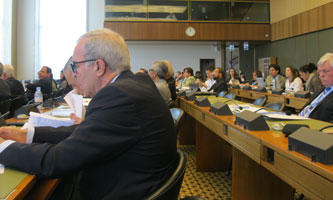 .
. 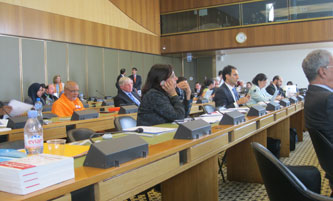
Audience
The final panel was on moving towards a new paradigm. It noted some of the disconnects in religious sentiments, with the problem not in beliefs but in divisive belonging becoming tribal and rejecting others. There is a wide gap between legal equality and equality before God. A new paradigm is obviously needed. We must give people the right to hope. Finding relevant texts in the Holy Books can counteract fear from religious bias, and provide resources to respect the others. God is testing us by what he has revealed to us. We should compete with each other in doing good deeds. Large majorities want reduced military expenditures and more on social needs, but all countries do the reverse. It was pointed out that the youth are absent from the conference, but they will inherit the world. Equal citizenship can be a gateway to global citizenship and peace.
This report with excerpts from the final declaration is also available on the IEF web site.

Return to Switzerland page - Return to personal home page
Last updated 8 July 2018
Photographs copyright © Arthur Lyon Dahl 2018